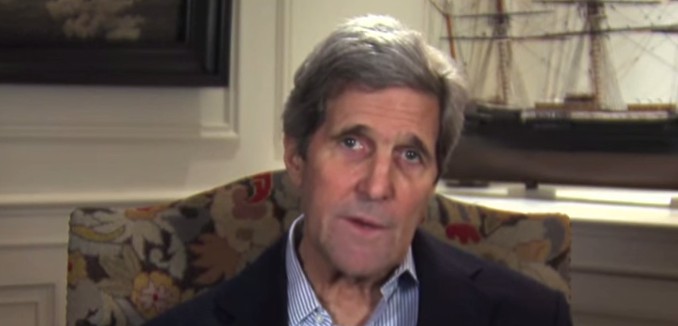Secretary of State John Kerry asserted that Iran will not be required to account for its past nuclear work as part of any nuclear deal. At a press briefing yesterday, Kerry said:
Michael, the possible military dimensions, frankly, gets distorted a little bit in some of the discussion, in that we’re not fixated on Iran specifically accounting for what they did at one point in time or another. We know what they did. We have no doubt. We have absolute knowledge with respect to the certain military activities they were engaged in.
What we’re concerned about is going forward. It’s critical to us to know that going forward, those activities have been stopped, and that we can account for that in a legitimate way. That clearly is one of the requirements in our judgment for what has to be achieved in order to have a legitimate agreement. And in order to have an agreement to trigger any kind of material significant sanctions relief, we would have to have those answers.
In recent months, Yukiya Amano, director-general of the International Atomic Energy Agency (IAEA), has repeatedly contradicted Kerry’s assessment that the United States has “absolute knowledge” of Iran’s past nuclear work. In January, Amano asserted that the IAEA could not “conclude that all nuclear material in Iran is in peaceful activities.” While Amano acknowledged that Iran had observed the terms of the Joint Plan of Action (JPOA) in regard to its known nuclear program, its failure to account for its past nuclear work meant that the IAEA could not be certain that Iran’s past work was only for peaceful purposes. It is an assessment that he has echoed several times since.
Experts including Olli Heinonen, the former deputy director-general of the IAEA; General Michael Hayden, former American Director of Central Intelligence; and David Albright, president of the Institute for Science and International Security, have all raised concerns that the West has insufficient knowledge of Iran’s illicit secret nuclear program. Notably, a former Obama administration official was quoted in The New York Times in November 2013 saying that “there has never been a time in the past 15 years or so when Iran didn’t have a hidden facility in construction.”
The importance of knowing about Iran’s past nuclear research was explained last year by Omri Ceren, The Israel Project’s managing director for press and strategy.
At stake are international concerns over the so-called possible military dimensions (PMDs) of the Iranian nuclear program, the central significance of which has sometimes been underplayed by voices within the foreign policy community. While the P5+1 is charged with negotiating over Iran’s uranium work, its plutonium work, and its ballistic missile work – all of which the Iranians are obligated by half a dozen United Nations Security Council (UNSC) resolutions to roll back – the IAEA seeks to establish the scope of Iran’s overall atomic program, including in those three more specific areas.
The mandate stretches beyond full-blown weaponization work, and into military involvement in uranium mining, centrifuge construction, and so on. Full Iranian disclosure is considered a minimum to establishing a robust verification regime: The IAEA can’t verify that Iran has met its obligations to limit uranium work, for instance, unless it knows the full scope of the uranium work that’s being done. PMD-related transparency is seen as not just another issue – say, one that Iran could refuse to trade away by making concessions in other areas – but as a prerequisite to verifying Iranian compliance across all issues.
The Israel Project publishes The Tower.
Kerry’s acknowledgement of the administration’s capitulation on the issue of Iran’s past nuclear work comes in the wake of a report last week that the United States is poised to expand the scope of sanctions relief to Iran beyond nuclear sanctions, and that the West has consistently ignored Iran’s ongoing sanctions violations.
Both the European Union and the IAEA have said that no deal is possible without Iran’s accounting for all of its past nuclear work.
This week it was reported that Sen. Bob Corker (R – Tenn.) sent a letter to President Barack Obama citing the retreat on Iran’s past illicit nuclear work as one of a number of the administration’s capitulations to Iran.
[Photo: U.S. Department of State / YouTube ]




